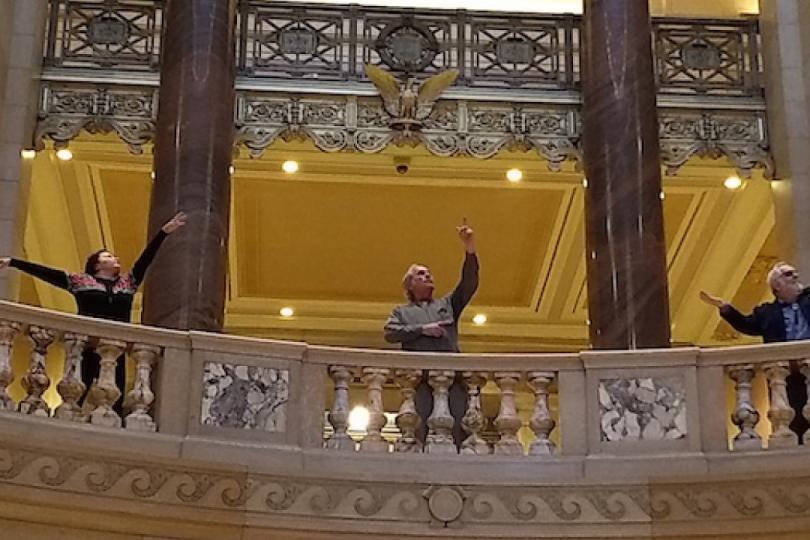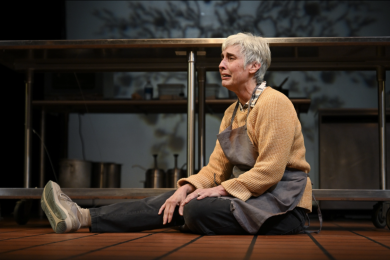Whose voices matter?

You’ve got your nontraditional theater spaces and then you’ve got a play performed in multiple rooms within the Minnesota State Capitol building.
As is usually the case with a Wonderlust Productions venture, the story behind Our House: The Capitol Play Project is as interesting as the play itself. Or rather, the story behind the play is the play itself. The Wonderlust approach involves writer-directors Leah Cooper and Alan Berks (also the founders and former owners of Minnesota Playlist, for disclosure’s sake) conducting extensive interviews with members of a specific community, such as military veterans or adoptees, and adapting their experiences - and in some cases, their verbatim words - into a dramatic narrative.
Our House puts the focus on people who have spent significant time around the Capitol building, including elected officials, staffers, lobbyists, pages, and protestors. Along with those preliminary interviews, most of the cast members also have some manner of personal connection to state government. The biggest hook, though, is that Wonderlust has procured the Capitol building itself as a venue. That's an impressive angle, no question about it, but it also means the play runs the risk of coming off like either a gimmick or a stodgy educational venture.
Whose voices matter?
As the show kicks off, both of those concerns seem possible, with Capitol tour guides splitting the audience into three groups and leading an interpretive tour of the building, complete with all of the informational tidbits about gubernatorial portraits and architectural flourishes that you might expect. Once the crowd reassembles in a basement rotunda, though, the off-kilter energy kicks in. The loose plot finds the government in an uproar as an unorthodox third-party governor takes office. When two gossipy pages mistake newly hired welcome-desk worker Ginger Commodore for the governor’s as-yet-unknown chief of staff, Commodore’s activist daughter Gabrielle Dominique sees an opportunity to get some underrepresented perspectives in front of the people who call the shots.
The production is driven by the underlying question of “Whose voices truly matter in Minnesota?” but Our House is also interested in any number of side stories and digressions. Peppered throughout the action are historical skits, comedy set pieces, and even full-on musical numbers explaining the day-to-day goings-on underneath the Capitol dome. It would be tough to walk away from this show without having learned some new facts, but this isn’t Schoolhouse Rock style edutainment so much as a search for Minnesota’s identity through the lens of its history.
Making the most of a singular venue
There’s no guarantee that all of this should work as theater, but Cooper and Berks do a skillful job of pressing their once-in-a-lifetime venue into the service of their story rather than the reverse. In their hands the rotunda becomes a theater-in-the-round, conference rooms and congressional chambers become immersive theater spaces, and even the hallways serve as auditoriums. In its second half, Our House moves from floor to floor, slyly giving the audience a tour of the newly refurbished Capitol building that just happens to mesh with the action as Commodore, Dominique, and frustrated communications staffer Pedro Juan Fonseca team up to push their subterfuge farther and farther up the ladder.
Wonderlust’s approach of intensive interviewing serves the show well, as many of the exchanges captured here ring true in a decidedly non-stagey way: a triad of same-named congressmen who jokingly define themselves as “Good Dave,” “Dirty Dave,” and “Duluth Dave,” for instance, or a state representative who takes genuine pride in rattling off cross-stitch platitudes about hard work and clean living while bluntly dismissing the concerns of anyone who doesn’t live in her district. That includes the likes of Fonseca and Dominique, who are repeatedly told that their attempts to spur social change will never amount to anything unless they manage to talk to just the right person at just the right time in just the right tone, and even then, the odds are that their efforts will be squashed by someone further down the line. Sadly enough, their stories ring truest of all.
Ultimately what’s most impressive about Our House is how much of its ambition is fulfilled. Mounting any production in the Capitol building would have been noteworthy in its own right, regardless of the scope or content. Delving into the true-life experiences of such a wide array of Capitol employees and associates and translating them into a coherent piece of theater would be similarly striking. And creating a compelling, timely narrative that neither shies away from current political realities nor panders to its presumably left-leaning audience is an eternal challenge. All three coming together in one outsized package adds up to a theater experience that isn’t like much of anything you’re likely to see on a Minnesota stage, or, for that matter in the halls of the Capitol.




